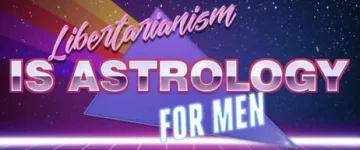<>We aren't anarchists, most of us recognize the need for small, local, limited government and a federal government that stays within their enumerated powers. Why is this such a bad thing? <>
If you find yourself getting accused of being an anarchist, it's probably because people notice that there doesn't seem to be anything you want the federal government to actually
do. This is quite common against Libertarian-Right people. All they talk about is things the government
shouldn't do. They are basically closeted anarchists. Oh, they'll
say they don't want to abolish government. But they also won't ever agree that federal government should be doing a given thing.
More broadly, what's the problem with the thought process?
First off, America would break down in to a tiny patchwork of micronations if you had your way. "small, local, limited government" cannot do the things federal government does. There are countless things that need top-down control: infrastucture (water, pipes, roads, etc), the monetary system, environmental policy, etc. The Big-L libertarian country is an impossibility.
Second off, we've seen the libertarian's pipe dream in modern times. It's called the industrial revolution. Child sweatshops, arms easily lopped off in preventable accidents, workers living in abject poverty, you name it. It was a horror show, not some glorious survival of the fittest.
And contrary to what the bulk of libertarian-right people will tell you, no, the free market did not solve any of this. The free market caused it. If every manufacturer doesn't give a ****, then you can't vote with your dollars by going to a better one (especially if you are not rich).
Strong libertarianism is a delusion, no better than communism or anarchism. Stupid, lazy idealism. It ignores humanity's basic ugly nature. It ignores the fact that if it's not government telling you what to do, it'll be moneyed interests or local warlords. It's simply impossible to have some kind of Free Utopia where everyone is exercising their freedoms, doing whatever they want, and things work out just swimmingly. Someone is always going to seize control. Where >1 people exist, there will necessarily be "government" of some form. The question is whether you want to retain any control over that someone.
And it's a completely insincere way for people to tell themselves that they're tough rugged individualists who are principled. Why? Because you know perfectly damn well you'll never see Big-L libertarianism come into being. You know you'll never have to pay the price of finding out how a virtually non-existent federal government and a patch work of a million little localities with their own unique rules would work.
Libertarian-left people tend to be far more sensible, understanding that there are things that the federal government must do if America is to remain one nation, but generally not wanting government sticking its nose into social issues or telling people what they can put in their bodies, generally opposing abuse of the citizenry by law enforcement, and the like. Big-L libertarian thought.
PS: what's wrong with the "enumerated powers" comment is that people who make remarks like that often consider themselves the sole correct arbiter of what is or is not within an ennumerated power. And in the process of doing that, the same people dishonestly ignore the fact that all but two framers that hot Philly summer wanted the Supreme Court to apply English common law traditions to jurisprudence, both as to federal statutes and constitutional interpretation.
And guess what. Engllish common law is all about the law evolving to meet the time. Whereas the bulk of people who say they're libertarian-right seem to think that constitutional interpretation should have been frozen as of some arbitrary point in the founding era.

